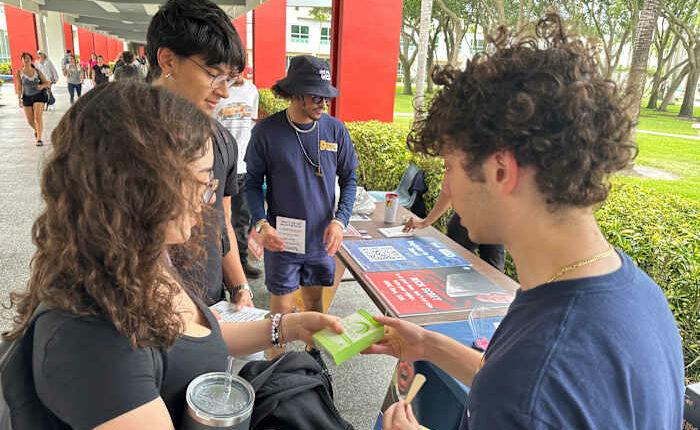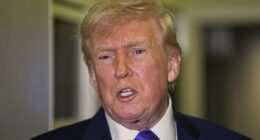Share this @internewscast.com

WASHINGTON – Mairekk Griffiths, a 26-year-old cook from a Denver suburb, doesn’t anticipate paying much attention to U.S. politics unless there’s a significant shift in the landscape.
“If another party were likely to win, I’d be interested in that,” stated Griffiths, who supported Democrat Kamala Harris in the last presidential election but, similar to many in his age group, doesn’t view voting as particularly meaningful.
“I can’t say either way that voting matters,” Griffiths remarked. “It’s just about choosing the lesser of two evils. That’s all I’ve known throughout my life — both choices are unfavorable, but one is slightly better.”
Young individuals like Griffiths tend to be less involved in U.S. politics compared to older citizens and are less inclined to view voting as crucial, as per a new survey by The Associated Press-NORC Center for Public Affairs Research. Even those who closely follow politics among younger generations are less likely than their older counterparts to label issues such as the economy, government expenditure, and healthcare as “extremely important.”
The results highlight a widespread sense of disillusionment with the political system among young people, even if, like Griffiths, they still decide to cast their vote. Alberto Medina, who directs the Center for Information and Research on Civic Engagement at Tufts University, which examines youth and politics, pointed out that youth voter turnout reached unprecedented levels in the 2020 election and remained high last year.
“There’s a perception that democracy isn’t benefiting young people. There’s skepticism regarding democracy’s capacity to improve their lives,” Medina commented. “Nonetheless, we are in a period marked by high youth voter participation.”
Disengagement from political parties and politics
In another sign of their general estrangement from politics, the poll shows young adults are more likely to reject political party labels. About one-third of adults under age 30 identify as political independents who don’t lean toward either major political party, compared with 17% of Americans age 60 or older.
The poll also finds young people are far less likely to follow politics closely than older adults are.
Only about 2 in 10 of adults under age 30 say they follow U.S. politics “extremely” or “very” closely, compared with about one-third of Americans overall. That’s even higher among adults age 60 or older — 45% of this group says they follow U.S. politics at least very closely.
Disengagement is higher among teenagers, with an AP-NORC poll from May finding 44% of teens ages 13 to 17 report following U.S. politics “not very closely” or “not closely at all.”
Meanwhile, about two-thirds of adults under age 30 say it’s “extremely” or “very” important to vote, compared with almost 9 in 10 over age 45 who say it’s at least “very” important to vote.
Some of these habits could shift as people grow older. Younger people traditionally are less likely to vote than older people, and voter participation tends to go up with age. It’s possible that engagement with politics could follow a similar pattern.
Brittany Diaz, 28, follows politics closely for an unusual reason: Her oldest son, who is 7, is obsessed with the news and watches it every night. Diaz, a Republican who lives in an Albuquerque, New Mexico, suburb, acknowledges that she’s unusual among her age group because she decided to start paying attention to politics when she had her first child at 20.
“Now that I have kids, I’m like, ‘I need to care,’” she said.
In closely following politics, Diaz is different from many other women under 30.
Women in her age group are less likely than young men to say they follow U.S. politics, the poll finds. About one-quarter of men under 30 say they follow politics “extremely” or “very” closely, compared with 16% of women in the same age group. And about 4 in 10 young women say they follow U.S. politics “not very closely” or “not closely at all” compared with about a quarter of young men.
Lower investment in key issues
On a few issues, such as the economy and health care, the divide between the youngest and oldest Americans isn’t large. About 8 in 10 Americans under age 30 say the economy is “extremely” or “very” important to them personally, compared with about 9 in 10 Americans age 60 or older.
But older adults are much likelier to say topics that have taken center stage during the first six months of President Donald Trump’s second term — including immigration and government spending — are “extremely” or “very” important to them personally compared with Americans under 30.
That’s even true for topics such as the situation in the Middle East, which has become a rallying cry for young activists since the Israel-Hamas war broke out. Only about 4 in 10 adults under 30 say this is highly important to them personally, compared with about 6 in 10 Americans age 60 or older.
For some, that lack of interest could be related to a sense that the political system doesn’t respond to their needs.
At 18, Blake Marlar is just starting to pay attention to politics. As Trump’s tax cut and spending bill moved through the Republican-controlled Congress, the aspiring geology major at the University of Nebraska emailed his state’s two senators, both Republicans, objecting to its Medicaid cuts and increases in immigration enforcement funding.
“They didn’t seem to take me seriously,” Marlar said. “While I recognize they have to represent the whole state and the whole state doesn’t agree with me, it could have been a different experience.”
But he’s resolved not to give up on politics: “In the future,” he said, “I’ll do my part and vote.”
___
Riccardi reported from Denver.
___
The AP-NORC poll of 1,437 adults was conducted July 10-14, using a sample drawn from NORC’s probability-based AmeriSpeak Panel, which is designed to be representative of the U.S. population. The margin of sampling error for adults overall is plus or minus 3.6 percentage points.
Copyright 2025 The Associated Press. All rights reserved. This material may not be published, broadcast, rewritten or redistributed without permission.











